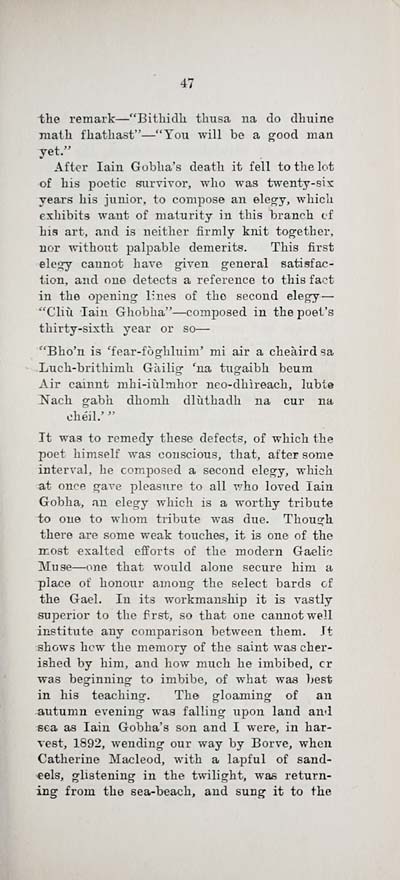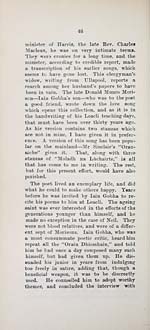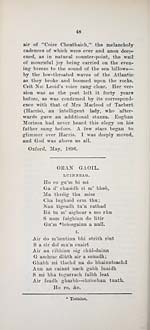Download files
Complete book:
Individual page:
Thumbnail gallery: Grid view | List view

47
the remark — "Bitliidk tliusa iia do dliuine
math fhathast" — "You will be a good man
yet."
After Iain Goblia's deatli it fell to the lot
of his poetic survivor, who was twenty-six
years his junior, to compose an elegy, which
exhibits want of maturity in this branch cf
his art, and is neither firmly knit together,
nor without pal^^able demerits. This first
elegy cannot have given general satisfac-
tion, and one detects a reference to this fact
in the opening l:nes of the second elegy —
"Cliù Iain Gliobha" — composed in the poet's
thirty-sixth year or so —
"Bho'n is 'fear-fòghluim' mi air a cheàird sa
Luch-brithimh Gàilig 'na tugaibh beum
Air camnt mhi-iiilmhor neo-dhireach, lubte
Nach gabh dhomh dlùthadh na cur na
oheil.' "
It was to remedy these defects, of which the
poet himself was conscious, that, after some
interval, he composed a second elegy, which
at onf9 gave pleasure to all who loved Iain
Goblia, an elegy wJiich is a worthy tribute
to one to whom tribute was due. Though
there are some weak touches, it is one of the
most exalted efforts of the modern Gaelic
Muse — one that would alone secure him a
place of honour among the select bards cf
the Gael. In its workmanship it is vastly
superior to the frst, so that one cannot well
institute any comparison between them. It
shows hew the memory of the saint was cher-
ished by him, and how much he imbibed, cr
was beginning to imbibe, of what was best
in his teaching. The gloaming of an
autumn evening was falling upon land and
sea as Iain Gobha's son and I were, in har-
vest, 1892, wending our way by Borve, when
Catherine Macleod, with a lapful of sand-
eels, glistening in the t^vilight, was return-
ing from the sea-besich, and sung it to the
the remark — "Bitliidk tliusa iia do dliuine
math fhathast" — "You will be a good man
yet."
After Iain Goblia's deatli it fell to the lot
of his poetic survivor, who was twenty-six
years his junior, to compose an elegy, which
exhibits want of maturity in this branch cf
his art, and is neither firmly knit together,
nor without pal^^able demerits. This first
elegy cannot have given general satisfac-
tion, and one detects a reference to this fact
in the opening l:nes of the second elegy —
"Cliù Iain Gliobha" — composed in the poet's
thirty-sixth year or so —
"Bho'n is 'fear-fòghluim' mi air a cheàird sa
Luch-brithimh Gàilig 'na tugaibh beum
Air camnt mhi-iiilmhor neo-dhireach, lubte
Nach gabh dhomh dlùthadh na cur na
oheil.' "
It was to remedy these defects, of which the
poet himself was conscious, that, after some
interval, he composed a second elegy, which
at onf9 gave pleasure to all who loved Iain
Goblia, an elegy wJiich is a worthy tribute
to one to whom tribute was due. Though
there are some weak touches, it is one of the
most exalted efforts of the modern Gaelic
Muse — one that would alone secure him a
place of honour among the select bards cf
the Gael. In its workmanship it is vastly
superior to the frst, so that one cannot well
institute any comparison between them. It
shows hew the memory of the saint was cher-
ished by him, and how much he imbibed, cr
was beginning to imbibe, of what was best
in his teaching. The gloaming of an
autumn evening was falling upon land and
sea as Iain Gobha's son and I were, in har-
vest, 1892, wending our way by Borve, when
Catherine Macleod, with a lapful of sand-
eels, glistening in the t^vilight, was return-
ing from the sea-besich, and sung it to the
Set display mode to: Large image | Transcription
Images and transcriptions on this page, including medium image downloads, may be used under the Creative Commons Attribution 4.0 International Licence unless otherwise stated. ![]()
| Early Gaelic Book Collections > Hew Morrison Collection > Leabhar Nan Gleann > (59) |
|---|
| Permanent URL | https://digital.nls.uk/76888536 |
|---|
| Description | A selection of items from a collection of 320 volumes and 30 pamphlets of literary and religious works in Scottish Gaelic. From the personal library of Hew Morrison, the first City Librarian of Edinburgh. |
|---|
| Description | Selected items from five 'Special and Named Printed Collections'. Includes books in Gaelic and other Celtic languages, works about the Gaels, their languages, literature, culture and history. |
|---|

